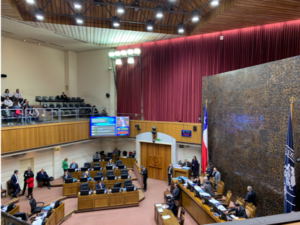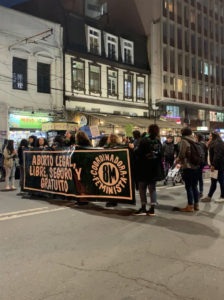During my third week in Chile, I have focused on learning about the history and modern politics of Chile.

Rather than a full dinner meal, many Chilean families eat once, a light snack consisting of pan with aguacate, salsa, or mayonesa, along with coffee or tea, as well as other items. My friend Kate invited me to stay over to eat once with her family yesterday evening after working on a presentation about former President Michele Bachelet, and we started to ask Kate’s mom about modern Chilean history. Her host mom then described how, when she was an architecture student in the early 1980’s, she was almost arrested during the first major protest against Pinochet. Before coming to Chile,I had never learned about the CIA’s involvement in Pinochet’s golpe de estado in any of my classes; however, this remains at the forefront of many Chileans’ minds when they talk about the United States. This makes me understand a little bit of what it means to be an American in another country: as the United States has had such a global presence in the last century, there are many countries which have been used as pawns to further American interests. The United States did not like the idea of a democratically elected socialist president in Latin America, so it supported a coup d’etat to put an end to the changes that Allende was making.

Not unlike en los estados unidos, there is a lot of pessimism in Chile about the government. Michele Bachelet, a moderate leftist, was widely unpopular by the end of her term in office due to allegations of her son’s corruption, only to be replaced by another unpopular right-wing president, Piñera. I able to witness a powerful act of nonviolent resistance against Piñera’s government as many Chileans got together to protest against his policies on abortion. Regardless of one’s views on abortion, this protest was a powerful demonstration of solidarity and of the culture of social protest within Chile. The female-led crowd demanded that abortion be “libre, seguro y gratuito”, which was interesting to me, because in the capitalist society of the United States, the idea that abortion may be free is not even on the table. To the crowd, the lack of access to abortion services meant that poor women would die. They put that fact at the forefront of their protest, making it incredibly powerful to watch, and to hear the women chant: “poder elegir, para no morir”.